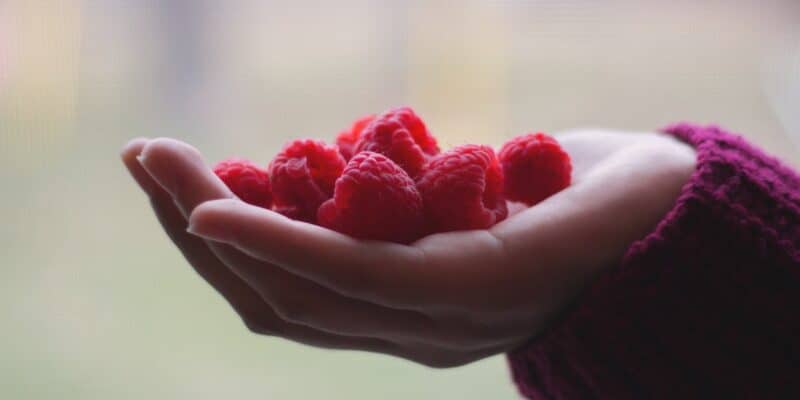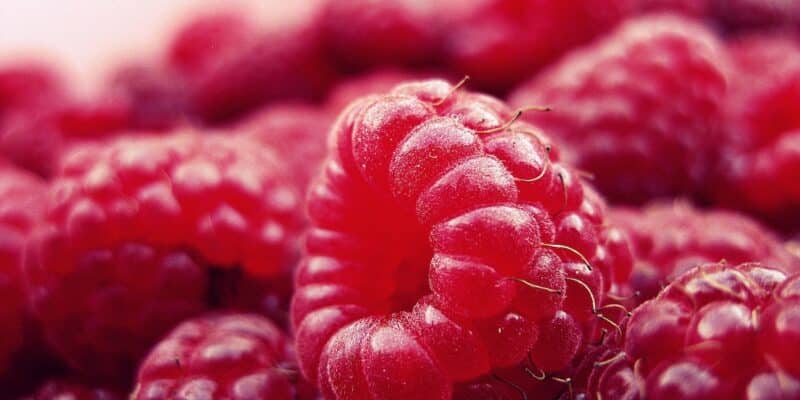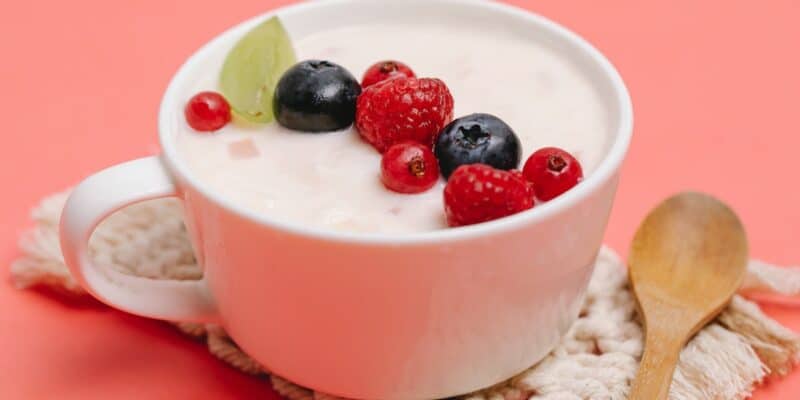Introducing raspberries or any form of solid food to babies is an important milestone in their development. It provides them with the nutrients they need to support their growth and development, including protein, iron, and other essential vitamins and minerals.
Solid foods also help babies learn new tastes and textures, which can help establish healthy eating habits later in life. Additionally, introducing solid foods to babies can help them develop their oral and motor skills, including chewing, swallowing, and manipulating food in their mouths.
It’s important to introduce solid foods at the appropriate time and in a safe and nutritious way to ensure babies are getting the nutrients they need while avoiding potential risks and hazards.
Adding raspberries to a baby’s diet provides important health benefits, a good source of vitamins C and K, which support healthy bone development. They contain antioxidants that protect against cell damage and promote overall health, fiber, which supports healthy digestion and promotes regular bowel movements.
As an Amazon Associate, I earn from qualifying purchases. The links below may be affiliate links. Please read my disclosure policy for more information.
When To Introduce Raspberries To Babies

While raspberries are a nutritious food for babies, it’s important to introduce them at the appropriate time and in a safe way to avoid potential choking hazards and allergic reactions.
Here are some guidelines for when babies can safely eat raspberries:
Age
It’s generally recommended to introduce solid foods, including raspberries, to babies around 6 months of age. At this stage, babies are typically able to sit up on their own and have developed the necessary oral and motor skills to eat solid foods.
Developmental Milestones
Before introducing raspberries, babies should be able to hold their heads up steady, sit up with support, and show signs of interest in food. These signs include opening their mouth when food is offered and reaching for food.
Allergies
It’s important to introduce raspberries gradually and watch for any signs of an allergic reaction, such as hives, swelling, or difficulty breathing. Parents should consult with a doctor before introducing raspberries if there is a family history of food allergies.
When introducing raspberries, it’s important to always supervise babies while they are eating and to cut raspberries into small, bite-sized pieces or puree them for younger babies to avoid choking hazards.
Parents can also consider mashing raspberries and mixing them with other baby foods to create new flavor combinations and textures.
Raspberries help develop babies’ taste buds and encourage them to enjoy a variety of flavors and textures in their diet. They are naturally sweet and can be a healthy alternative to processed sugars in baby food, low in calories and fat, making them a great addition to a baby’s diet for healthy weight management.
Choose organic raspberries to avoid exposure to pesticides and other harmful chemicals.
Nutritional Benefits

Introducing raspberries to babies can provide numerous health benefits when done safely and appropriately.
Raspberries are a rich source of essential vitamins, minerals, and antioxidants that can positively impact a baby’s overall health and growth.
Let’s explore some of the significant nutritional benefits of raspberries for infants:
Vitamins
Raspberries are an excellent source of vitamin C, which is necessary for a robust immune system, healthy skin, and better absorption of iron. They also contain vitamin K, which facilitates healthy blood clotting and bone development.
Minerals
Raspberries are abundant in essential minerals such as calcium, magnesium, and potassium, which promote healthy bone development, muscle function, and nerve function.
Antioxidants
Raspberries are loaded with antioxidants such as quercetin and ellagic acid that help prevent cellular damage and inflammation.
Besides these crucial nutrients, raspberries are also a low-calorie and high-fiber food that can aid in healthy digestion and promote regular bowel movements in babies. Adding raspberries to a baby’s diet can help establish healthy eating habits early on and contribute to a well-balanced and nutritious diet.
However, it’s important to note that raspberries should be given in moderation as part of a varied diet, and parents should always seek advice from a doctor before making any significant changes to their baby’s diet.
Tips For Preparing Raspberries For Babies

When incorporating raspberries into a baby’s diet, it’s important to choose ripe berries, and properly prepare them. Here are some tips for preparing and serving raspberries to babies:
Choose Ripe Berries
Look for raspberries that are brightly colored, plump, and free of mold or mushy spots. Ripe berries are sweeter and easier for babies to digest.
Wash The Berries
Rinse the raspberries thoroughly in cool water before serving to remove any dirt, pesticides, or bacteria.
Remove Any Stems
Cut off the stems of the raspberries before serving them to your baby.
Mash Or Puree
For younger babies, mash or puree the raspberries to a smooth consistency to avoid choking hazards. As your baby gets older, you can leave the raspberries in small pieces for them to chew.
Mix With Other Foods
Mix mashed raspberries with other baby foods to create new flavor combinations and textures. For example, you can mix mashed raspberries with oatmeal or yogurt.
Serve Safely
Safely serve raspberries to avoid choking hazards. Cut raspberries into small, bite-sized pieces or mash them before serving them to younger babies. Always supervise your baby while they are eating.
Introduce Gradually
Introduce raspberries gradually and watch for any signs of allergic reaction or digestive upset.
How To Minimize Risks

Feeding raspberries to babies can come with some potential risks and precautions, such as choking hazards and possible allergic reactions. Here are some tips to help you minimize these risks:
Choking Hazards
Raspberries have small seeds and a soft texture, which can make them a choking hazard for babies. To prevent choking, mash or puree the raspberries to a smooth consistency for younger babies and cut them into small, bite-sized pieces for older babies.
Allergic Reactions
Raspberries are not a common allergen, but they can still cause allergic reactions in some babies. Signs of an allergic reaction include hives, swelling, trouble breathing, and vomiting.
If you suspect your baby is having an allergic reaction, stop feeding them raspberries immediately and contact your doctor.
Introduce Gradually
Introduce raspberries gradually, one at a time, and watch for any signs of allergic reactions or digestive upset. Start with a small amount and wait a few days before introducing more.
Monitor for signs of allergies
Always monitor your baby for signs of allergies or digestive upset after feeding them raspberries. If your baby experiences any symptoms, stop feeding them raspberries and contact your doctor.
Avoid Pesticides
Choose organic raspberries to avoid exposure to pesticides and other harmful chemicals.

Raspberry Baby Food Recipes
Oatmeal with Raspberries
Ingredients:
- 1/4 cup of rolled oats
- 1/2 cup of water
- 1/4 cup of mashed raspberries
Instructions:
- Combine rolled oats and water in a small saucepan and cook over medium heat until the oats are soft and creamy.
- Add the mashed raspberries to the oatmeal and stir until well combined.
- Serve warm.
Yogurt with Raspberries
Ingredients:
- 1/2 cup of plain yogurt
- 1/4 cup of mashed raspberries
Instructions:
- Mix the plain yogurt and mashed raspberries in a small bowl until well combined.
- Serve chilled.

Raspberries with Avocado
Ingredients:
- 1/2 ripe avocado
- 1/4 cup of mashed raspberries
Instructions:
- Mash the ripe avocado in a small bowl.
- Add the mashed raspberries to the avocado and mix until well combined.
- Serve chilled.
Raspberries with Banana
Ingredients:
- 1 ripe banana
- 1/4 cup of mashed raspberries
Instructions:
- Mash the ripe banana in a small bowl.
- Add the mashed raspberries to the banana and mix until well combined.
- Serve chilled.
Raspberries with Cottage Cheese
Ingredients:
- 1/2 cup of cottage cheese
- 1/4 cup of mashed raspberries
Instructions:
- Mix the cottage cheese and mashed raspberries in a small bowl until well combined.
- Serve chilled.
Raspberries with Quinoa
Ingredients:
- 1/4 cup of quinoa
- 1/2 cup of water
- 1/4 cup of mashed raspberries
Instructions:
- Rinse the quinoa in a fine-mesh strainer and add it to a small saucepan with water.
- Bring the quinoa to a boil, then reduce heat to a simmer and cook for 15-20 minutes, until the water has been absorbed and the quinoa is fluffy.
- Add the mashed raspberries to the quinoa and mix until well combined.
- Serve warm.
Raspberries with Sweet Potato
Ingredients:
- 1/2 cup of mashed sweet potato
- 1/4 cup of mashed raspberries
Instructions:
- Mix the mashed sweet potato and mashed raspberries in a small bowl until well combined.
- Serve chilled.
Conclusion
In conclusion, incorporating raspberries into a baby’s diet can promote healthy growth and development by providing essential vitamins, minerals, and antioxidants. Nevertheless, caregivers should be mindful of potential risks and precautions, such as choking hazards and allergic reactions.
To mitigate these risks, it is crucial to gradually introduce raspberries, observe babies for any signs of allergies, cut them into small pieces to prevent choking and opt for organic raspberries to avoid harmful chemicals.
By including raspberries in a balanced diet for babies, caregivers can offer a diverse range of delicious and nutritious meals that support their overall health and well-being.


